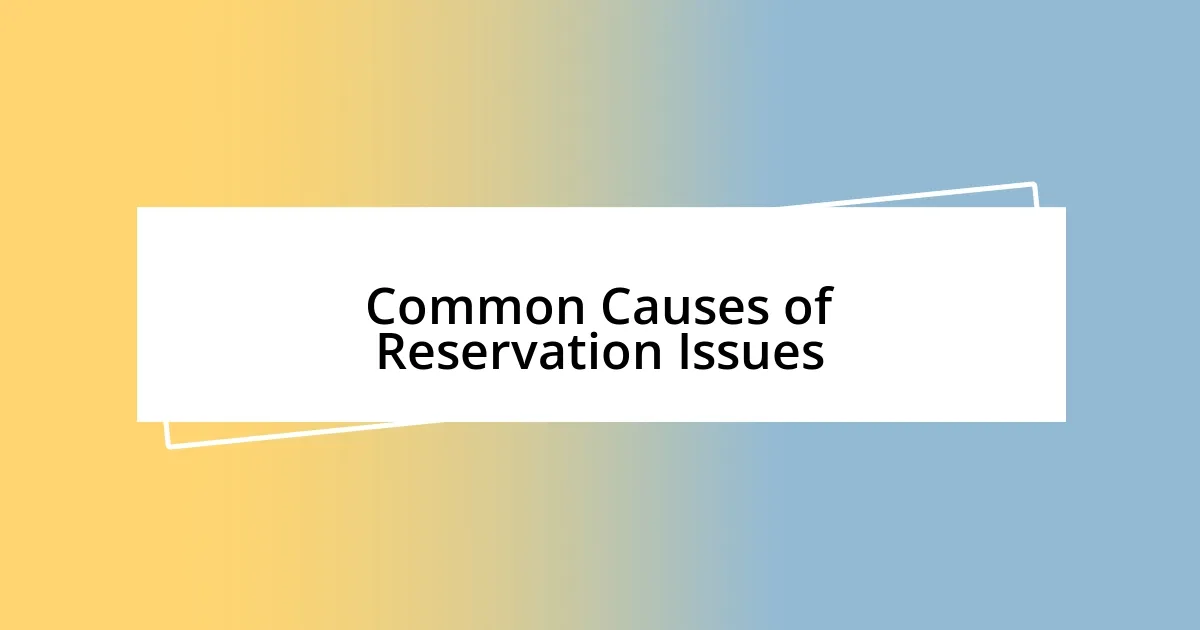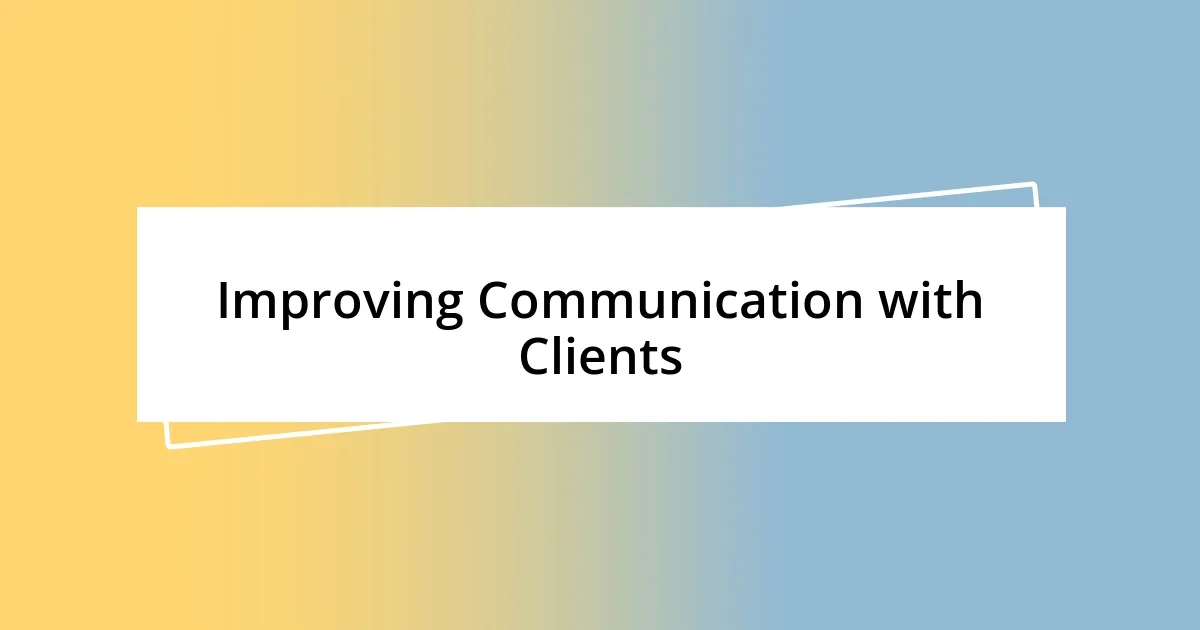Key takeaways:
- Reservation failures often arise from miscommunication, overbooking, and technological glitches, emphasizing the need for proactive measures.
- Keeping records of confirmations and consistently verifying bookings can significantly reduce stress and disappointment during travel.
- Effective communication with clients, including clarity and follow-up, enhances relationships and builds trust.
- Viewing failures as opportunities for growth can lead to innovation and improved systems within organizations.

Understanding Reservation Failures
Reservation failures can stem from various issues, and understanding these root causes is crucial. I recall a time when a minute discrepancy in my flight dates led to a cascade of problems. Isn’t it frustrating to be so close yet so far from a simple solution?
Sometimes, a lack of communication contributes significantly to reservation mishaps. I once experienced an awful scenario where a hotel failed to inform me about overbooking. Why is it that some establishments overlook the importance of notifying customers? This left me scrambling for alternative accommodations at the last minute, which is always a stressful situation.
Additionally, technology glitches can play a sneaky role in reservation failures. I remember trying to secure a table through an app only to find out it didn’t process my payment due to a server issue. How often do we put our trust in these systems, thinking they’ll work seamlessly? It’s a reminder that while we rely heavily on technology, it’s essential to have backup plans, especially when plans involve time-sensitive commitments.

Common Causes of Reservation Issues
Common causes of reservation issues often revolve around misunderstandings and technological failures. There was a time when I double-checked my dinner reservation, confident everything was perfect, only to arrive and find no record of it. The disappointment—even embarrassment—was palpable. It’s moments like these that make you appreciate how easily simple confirmations can lead to confusion.
Consider these common causes:
- Miscommunication between staff and customers
- Overbooking by hotels or airlines
- Human error during manual entry
- System outages or connectivity problems
- Last-minute changes by customers not being updated in the system
In my experience, I’ve discovered that relying solely on automated systems can sometimes backfire. I once had a flight reservation mishap that resulted from an app not syncing with the airline’s database. When I called customer service, it became apparent that technology can fail us in unexpected ways, adding layers of frustration to our travel plans.

Lessons from My Own Experience
Lessons from My Own Experience
There was one time, after a long week of work, I eagerly anticipated my weekend getaway. I had made the hotel reservation weeks in advance. However, when I arrived, the front desk clerk informed me that my booking had mysteriously vanished. That moment was crushing; all my excitement turned to disappointment as I was forced to look for last-minute accommodations at an inflated price. Has anyone else felt that sinking feeling when plans unexpectedly derail?
Another personal experience taught me about the importance of keeping records. I had a friend who once mentioned booking a table at a popular restaurant for our birthday celebration. When we arrived, there was no record of our reservation. Picture an overbooked restaurant on a Saturday night, and there we were, looking at the “waitlist” where hopeful diners stood. Thankfully, the staff managed to squeeze us in, but it made me realize how essential confirmation emails or screenshots can be in preventing such frustrating situations.
Lastly, I’ve learned to embrace flexibility when plans go awry. Once, I arrived at an airport, only to discover my flight had been canceled due to a snowstorm. Instead of panicking, I found a cozy lounge where I could unwind. This experience taught me that while failed reservations can be disheartening, they can also lead to unexpected opportunities for adventure. Isn’t it funny how sometimes, a detour can turn into a hidden gem of an experience?
| Experience | Lesson Learned |
|---|---|
| Hotel Booking Vanished | Always confirm bookings and be ready to adapt. |
| Restaurant Reservation Mishap | Keep records of reservations to avoid misunderstandings. |
| Flight Canceled | Embrace flexibility; detours can lead to unexpected adventures. |

Strategies to Prevent Future Failures
One effective strategy I’ve adopted is to always confirm my reservations a day or two in advance. For instance, I once called ahead for a table at a trendy restaurant that I’d been looking forward to visiting with friends. To my surprise, the staff informed me of a discrepancy with my booking. Thankfully, I reached out early enough to secure a spot, reinforcing that a quick call can save a lot of disappointment. Have you ever thought about how a simple confirmation could save your plans?
Another approach I’ve found useful is keeping a designated spot on my phone for screenshots of booking confirmations. I remember once standing at the airport, realizing I had misplaced the confirmation for a rental car. With no record to show, I faced a long wait and the risk of losing my reservation altogether. This stickiness of technology can be frustrating, but having quick access to these images not only puts my mind at ease but also strengthens my confidence in managing my travel plans effectively.
I’ve also learned to strengthen my relationships with customer service representatives. One time, an agent went out of her way to assist me after my hotel mistakenly lost my reservation. I had planned a surprise getaway for my partner, and the idea of having to change those plans was incredibly stressful. Luckily, a friendly voice on the other end helped me secure a room at a nearby hotel. Isn’t it interesting how a little empathy and good communication can transform a stressful situation? Building rapport with service staff can pave the way for smoother resolutions when issues do arise.

How to Handle Customer Complaints
When faced with customer complaints, I’ve found that actively listening is crucial. I recall a time when I had to manage a guest upset about a double booking at my event space. Rather than jumping in with excuses, I simply listened to her frustrations. That allowed me to empathize and understand her point of view while reassuring her that I genuinely cared about resolving the issue. Isn’t it fascinating how just taking a moment to listen can transform a negative experience into a collaborative solution?
Following the conversation, addressing the complaint promptly is key. Once, a friend of mine booked a service that didn’t meet their expectations. They reached out to the provider and, to their surprise, received a response within hours. The company not only apologized but also offered a refund along with a complimentary service next time. This taught me that swift action not only mitigates frustration but can also turn an unsatisfied customer into a loyal advocate. Have you ever noticed how a quick resolution can change someone’s entire perception of a brand?
Lastly, following up after resolving an issue can have profound effects. I once had a minor mishap with an online order, and after it was sorted out, the company sent me a personalized email thanking me for my patience. That little gesture transformed my irritation into appreciation. It got me thinking—what if more businesses considered the importance of post-resolution communication? It’s something I strive to incorporate in my dealings because it reinforces trust and loyalty.

Improving Communication with Clients
One key element I’ve found in enhancing communication with clients is the importance of clarity in all exchanges. I remember at one point when I was coordinating a group trip, and the itinerary became muddled due to vague instructions. I was bombarded with questions and confusion from my friends, which led to stress on my part. Have you ever experienced that knot in your stomach when plans unravel? Clearly articulating details, such as meeting times and locations, kept everyone on the same page and made the process far more enjoyable.
Establishing a feedback loop has proven invaluable in my communication efforts. After a particularly challenging project, I reached out to clients for their thoughts on how things went. Their responses revealed insights I hadn’t considered, like how certain aspects didn’t meet their expectations. What struck me was how genuinely grateful they felt for the opportunity to speak their minds. This two-way communication strengthened our relationship and allowed me to tailor future offerings to better suit their needs. Isn’t it interesting how a simple ask can open doors?
Lastly, being proactive in checking in with clients, especially after a reservation is made, has become a game changer. Once, after booking a venue for an important event, I followed up a week later to confirm details and see if they had any special requests. To my surprise, they appreciated my thoughtfulness and suggested ideas that enhanced their experience. Don’t you think that reaching out shows genuine care? This small step not only fortified our relationship but also assured them that their experience was my top priority.

Transforming Failures into Opportunities
Transforming failures into opportunities can feel like a daunting task, but it often leads to unexpected growth. I once witnessed this firsthand when a double reservation occurred at my venue. Instead of viewing it as a setback, I saw it as a chance to enhance our booking system. By analyzing the mistake, I identified gaps that didn’t align with our customer needs, which allowed us to strengthen our protocols for future events. Have you ever noticed how a simple insight can change your entire approach?
Embracing failures has also taught me the value of innovation. After a crucial meeting was derailed due to an incorrect reservation, I felt frustrated. But that moment sparked a brainstorming session with my team about how we could leverage technology to prevent similar issues. We ended up implementing a real-time booking system that not only reduced errors but also streamlined our communication process. I can’t help but wonder—how many times have we overlooked the silver lining in a frustrating situation?
One particularly poignant lesson came from a client who canceled a booking last minute. Instead of frustration, I reached out to understand their reasoning. Their feedback highlighted aspects of our service that needed improvement, leading me to revamp our offerings. Recognizing this failure as a learning curve transformed my perspective, fostering a culture of adaptability within my team. Have you realized the hidden forms of feedback in failures that could lead to significant improvements in your own experiences?












